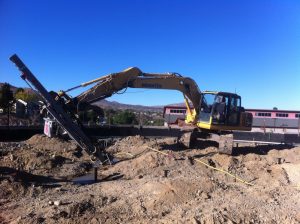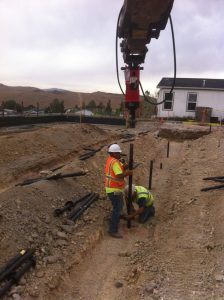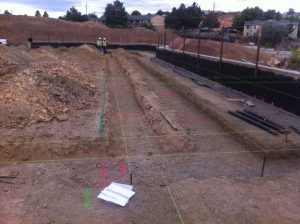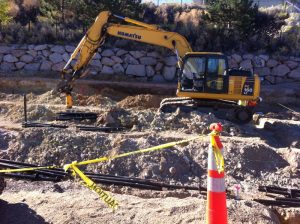The Process of Hiring a General Engineering Contractor and What To Look For
If you're planning a construction project, finding the right sitework contractors and general engineering contractor is crucial to ensure that the project is completed safely and to the highest standards. In the Reno area, it's important to work with experienced and reliable Reno engineering contractors who have a strong reputation in the community.
Where To Begin?
Start by researching sitework contractors and general engineering contractors in the Reno area. You may find that many people will recommend Versa Grade for your general engineering needs.
General engineering contractors must be licensed to work in the Reno area, so make sure to confirm that the contractor is licensed with the state's licensing board. Additionally, make sure the contractor has the necessary insurance to cover any accidents or damages that may occur on your property.
After verifying licensing and insurance, request quotes from Reno general contractors. Provide each contractor with detailed information about your project, including the scope of work, timeline, and budget. This will help them provide an accurate quote for the job.
Look for a contractor who has years of experience in sitework and has successfully completed similar projects in the past. Experienced contractors are more likely to have the skills, knowledge, and equipment necessary to complete your project on time and within budget.
Consider Quality and Price
When comparing quotes, look for a contractor who is committed to delivering high-quality work, prioritizes safety, and communicates clearly and frequently throughout the project. Don't base your decision solely on price.
Finding the right sitework contractors and general engineering contractor for your construction project in Reno requires careful research and consideration. By following this process and taking the time to find the right contractor, you can ensure that your project is completed safely and to the highest standards. Contact Versa Grade for all your sitework and general engineering contractor needs in the Reno area.
Step 2 - New Construction Pile Fixing Foundation 12/23/2015
PROJECT DESCRIPTION:
STEP 2 is a private non-profit organization that has been serving Northern Nevada since 1986. Its mission is to provide comprehensive, coordinated services related to the treatment and recovery of chemically dependent women and their families. The 12,000 square foot expansion project adds a 20 bed residential housing component and storage facility to the already existing Mathewson Family Counseling Center and Transitional Cottages. The design vision of the project is to accommodate the everyday living needs of women and children in distress.
PROJECT HISTORY:
The project site is located north of the Reno / Sparks Area in Nevada on the foothills of Peavine Mountain. The area is predominately made up of Alta Formation soils components that contain hard volcanic rock, highly expansive clay minerals, and corrosive soil properties. The soils investigation confirmed the project site would not be conducive for conventional foundation construction. A deep foundation system was decided to be the best course of action, but due to the soil properties and its inconsistent nature, no one foundation system type could be utilized. VersaGrade was contacted early in the design process to help determine the best and most economical approach for this problem site to prevent fixing the foundation if issues later arose. It was determined that a mix of deep foundation types that included Ram Jack Helical Piles and Contech Micro Piles would be necessary to overcome these problem soils.
HOW WAS RAM JACK INVOLVED?
VersaGrade, Inc. was awarded the subcontract to install Ram Jack Helical Piles and Contech Systems Micro Piles on two adjacent project sites. One site was “The Living Center” and the other was “The Storage Facility”. Both building foundations were similarly designed as a pile and grade beam system. Since the soils were highly expansive, the entire foundation system was designed with a 6” void space under it to allow the clay soils to expand and contract without contacting the foundation system. 6” thick by 10” wide Sure Void was installed along the bottom of all grade beam trenches to provide the separation between soil and grade beam. Lateral stability which is normally achieved by the weight of the building on the underlying soils, was alternately achieved by the use of angled (Battered) piles installed at load points throughout the buildings footprint.
The Living Center foundation plan consisted of 95 vertical piles and 22 angled piles with working loads of 34,000 pounds and 10,000 pounds respectively. Installation depths varied wildly with helical piles ranging from 10’ - 60’ to achieve adequate load carrying capacities. Where helical piles could not be installed due to solid and fractured rock obstructions, Injection Bore (IBO) Micro Piles were installed to a depth of 20’ with a 4’ unbonded length. The Storage Facility foundation plan consisted of 62 vertical piles and 14 angled piles. The grade beam design on both buildings was only 10” wide, which made layout and installation techniques critical. Pile migration during installation of 1.5” was unacceptable.
VersaGrade used a Komatsu PC-160 Track-mounted hydraulic excavator with a Pro-Dig two stage 12K drive motor for the Helical installations and an Excavator Mount TEI 350 Rock Drill and ChemGrout CG600 Batching Plant for the Micro Pile installations.
Total No. of Ram Jack Helical Piles installed: 150
Total No. of Contech Micro Piles installed: 43



